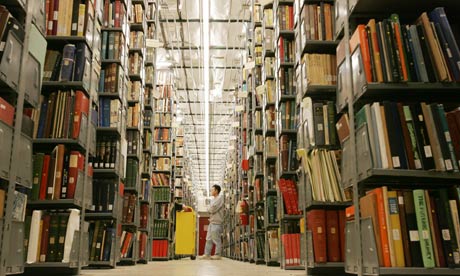Books provide you with access to content from times long past. Without them, we would have little more than stories, presumptions and lore to go by. Books do their job dutifully, with some books even enduring thousands of years of use.
Protect Rare & Fragile Works with Book Scanning
Topics: book scanning, Book Scanner, library, library scanning, digitizing library, books
For libraries and archives, data is the only asset that really matters. Unfortunately, it can be difficult to consistently preserve all of the data that your library or archive stores because physical storage mediums such as paper and microfilm break down over time and are very susceptible to damage. What's more, these mediums are expensive and time consuming to reproduce. Unless you have a high-tech, airtight facility wherein nobody has physical access to your archives, this can make the outlook for long-term preservation seem dismal.
Topics: digitizing library, archives, digital archives
 Integrated library systems that provide quick, convenient access to myriad resources are the way of the future. Indeed, the transition is already taking place. Digitization of library resources is the goal institutions are aiming for to maintain their status as centres of knowledge and information in the digital age.
Integrated library systems that provide quick, convenient access to myriad resources are the way of the future. Indeed, the transition is already taking place. Digitization of library resources is the goal institutions are aiming for to maintain their status as centres of knowledge and information in the digital age.
The digitization of library systems and services is no small feat. It requires format transitions for a variety of items, from books to manuscripts, historical information to microfilm, newspaper collections and beyond. It also means the development and implementation of online databases for improved information sharing and distribution. Such a transition can come with quite the price tag.
However, developing a fully digitized, integrated library system doesn’t have to break the budget. Here are some steps you can take to digitize your library on a budget.
Topics: library, libraries, digitizing library
How Library Systems and Services are Changing in the Digital Age
A simple truth about digital technology is that it is transforming the ways that library systems and services operate. Not only is technology itself advancing, but the expectations of users are also changing; today, people expect to be able to access all manner of information digitally.
Analog documents – books, newspapers, microfilm, microfiche, town records, historic information – are still important, but there is a recognized need to have them digitized in order to improve access and availability. And documents are not the only things being affected by the digital age. Increasingly, libraries and other informational institutions are rethinking the ways they provide services to their clientele. Below are some of the bigger transformations library systems and services are experiencing in the age of digital media.
Topics: libraries, library scanning, digitizing library



